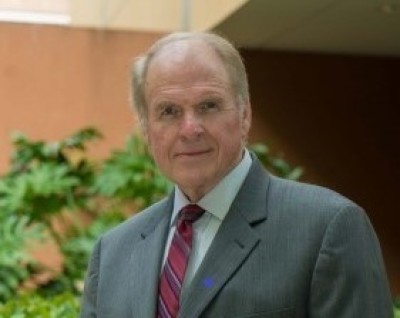The Lord of time and the 'doomsday clock'

The keepers of the “Doomsday Clock” met virtually this year due to the pandemic. Not so the Lord of time and history and His team when they literally met at the Mount of Olives (“Olivet”) two thousand years ago. There and then, Jesus gave them, not an estimate of coming events, but a factual report of their position in time and where history was headed.
This account came from the mouth of the Lord of history for Whom and by Whom time, the crucible of history, exists.
The “Doomsday Clock” is the imaginary timepiece envisaged in 1947 by a group of atomic physicists that included Albert Einstein. The experts who produce The Bulletin of Atomic Scientists (BAS) wanted to find ways to assess everything from global environment and population to nuclear arms and global war threats.
“Midnight” meant the arrival of “Doomsday” when worldwide trends would mount up to an explosive point — perhaps even nuclear war. On September 27, their calculations showed that in 2021 the crises are not pulling back. Rather, the “clock” is stuck at “100 seconds” to midnight — where it was last year.
But on that day twenty centuries ago the Carpenter from Nazareth did not view finite time as a runaway train. John, one of Jesus’s followers present that day at the Mount of Olives, decades later will hear a heavenly voice inviting him to “come up here” to be shown the future. (Revelation 4:1)
The Nazarene Carpenter already has that lofty perspective. The higher one goes in space the more comprehensive the view will be. The same is true of the temporal perspective.
In His Olivet discourse Jesus shows the biblical view of time. First, there are two categories. Kairos is the time-quality of the Kingdom of Heaven. It is non-linear (meaning it can pop up anywhere) and is packed with destiny. Kairos is also non-tensed. It manifests all along the line of finite time when a pleroma-point has been reached, according to God’s will.
“Pleroma” is “fullness,” as in a cup filled to its brim. The Pleroma marks the arrival of kairos, the “opportune time” for God’s purposeto be manifested in kronos, the finite, tensed time of the material world. (See Galatians 4:4) The reality already exists in eternity. This is why Jesus is “the lamb slain from the foundation of the world.” (Revelation 13:8)
Therefore, on that kairotic day on the Mount of Olives recorded in Matthew 24 Jesus reveals that time is neither strictly cyclical nor linear but is linear-cyclical. Think of a train on a track. The content of the freight and passenger cars is the “stuff” of history. the whole of the train is moving toward its “T-point” in which “T” represents, not “termination,” but telos, purpose.
The BAS may be concerned about “doomsday” and the termination of nations and civilizations, but Jesus sees telos — the arrival of the Kingdom of Heaven — into the world.
True history flows from Paradise Lost (Genesis 1:1-2) to Paradise Restored (Revelation 21-22). In between is the journey through kronos. This is the point of Acts 3:20-21, where Simon Peter preaches that “times of refreshment will come from the presence of the Lord, and he will again send you Jesus, your appointed Messiah... For he must remain in heaven until the time for the final restoration of all things, as God promised long ago through his holy prophets...”
“Restoration” is a Greek word meaning to put things back into their original, mint condition —the paradise the world was before humanity’s plunge into sin.
The cyclical aspect of time means that though exact details of historic events in history do not repeat, there are events that cycle along the “track” that are similar in broad character. Mark Twain quipped that while time may not repeat itself it does “rhyme.”
The scientists comprising BAS try to tell us what to expect on the way to “Doomsday”. In the Olivet discourse, the Lord of time and history prophesies the historical trajectory toward the consummate “Telosday”:
- There will be intensifying religiosity, led by false messiahs and counterfeit prophets.
- “Nation will rise against nation.” In Greek, this is “ethnic group against ethnic group.”
- Famines and earthquakes will be increasingly widespread with greater levels of destruction.
- Jesus’s followers will be hated and persecuted and brought under severe tribulation “by all nations.”
- Many believers will abandon the faith and join the haters and persecutors.
- Lawlessness — anarchy — will increase, and there will be a loveless chill upon society.
- However, the Gospel of the Kingdom will be proclaimed in the whole world to every social, cultural, national, biological, and linguistic group on the planet.
Then, says Jesus, the telos — the pleroma-fullness that marks a kairos moment intersecting with kronos time, the destiny and purpose of God’s great plan of restoration will have come, along with the return of Christ and His Kingdom.
If BAS looked at each of these prophecies of Jesus and the statistical fulfillment in the present, they might discover that the “clock” is ticking faster than they realized, and that we are indeed living in an age — as Jesus put it — of “birth pangs.” (Matthew 24:8)
The hands of the “Doomsday Clock” may be stuck at “100 seconds,” but the “wheels” of the kronos-train are spinning with increasing speed.
Wallace B. Henley’s fifty-year career has spanned newspaper journalism, government in both White House and Congress, the church, and academia. He is author or co-author of more than 20 books. He is a teaching pastor at Grace Church, the Woodlands, Texas.




























